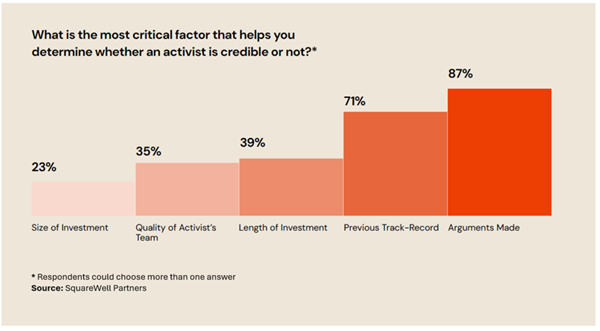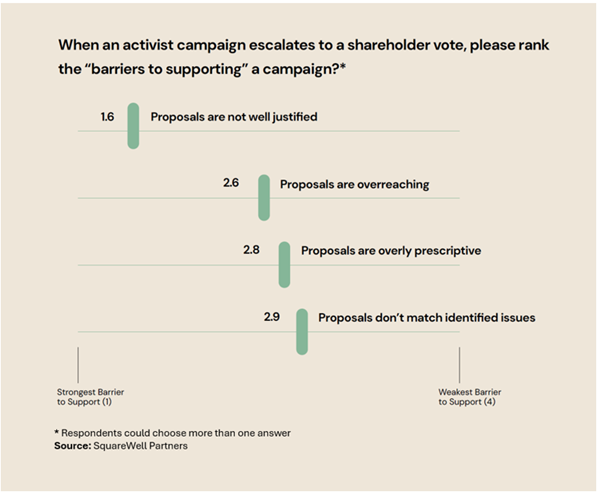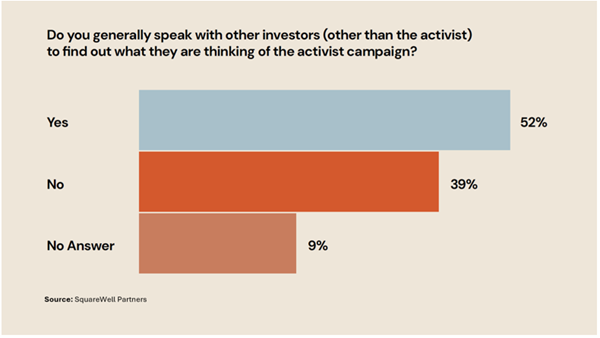|
Editor’s Note:
Ali Saribas is
a Partner, and Andrew
Brady is a Director at SquareWell Partners. This post
is based on their SquareWell survey. |
SquareWell Partners (“SquareWell”) conducted a survey of over 30
institutional investors collectively responsible for more than $35
trillion in AUM from North America, Europe, and Asia. The survey
engaged both Stewardship Team professionals and Portfolio Managers
from investors of a range of sizes, employing both active and passive
strategies, ensuring a balance of perspectives.
Survey questions were organized around three key themes: (1) Views on
Activism, (2) Evaluation Criteria, and (3) Engagement Dynamics.
The full survey can be downloaded from our website:
https://squarewell-partners.com/insights/
(1) Views on Activism
Investors overwhelmingly agreed that activism is a valuable market
force; roughly three-quarters of responses appreciate the role of
activists in catalysing change and driving accountability. More than
half of respondents also credited activists with bringing fresh
perspectives and promoting transparency and engagement from the target
company.
Despite this widespread appreciation for the outcomes of activism,
two-thirds of respondents remain cautious that activists can overlook
complexities by having a narrow focus. Half of investors surveyed
cited short-termism as a primary concern.
As shown in the graph, main contributors to an activist’s credibility
are intrinsically linked to these factors. Given the prominence of
investor concern that activists have a narrow and short-term focus,
the central element to credibility is the quality of the arguments
made. Similarly, given investors appreciate activists most for
catalysing change and bringing accountability, an activists track
record elsewhere matters. Features like length of investment and
holding size, are seen to be less relevant.
Graph 1
(2) Evaluation Criteria
In making the case for change, respondents ranked Return Metrics (TSR,
ROIC, ROE..) and Profitability Ratios (Operating Margin, Net Profit
Margin…) as the most appropriate for evaluating company performance.
Poor governance was seen as a trigger for activism by a large majority
of respondents (84%), reflecting the 71% of investors that confirmed
they were most comfortable supporting board-related activism (i.e.
affecting governance or management change).
The other types of activism – M&A, Balance Sheet and Operational –
were significantly less supported, indicating that while these issues
may be strong underlying rationale, investors prefer
governance-related demands. As shown in the graph, when these demands
are taken to a shareholder vote, investors consider the proposal’s
justification to be the first hurdle, followed by assessments of
overreach, prescriptiveness, and proposals matching issues identified.
Graph 2
(3) Engagement Dynamics
Reflective of the content of activism campaigns, Fund Managers play a
leading role in final voting decisions – with the support of
Stewardship Teams. Only 16% of respondents indicated that the final
voting decision is taken by the Stewardship Team alone.
Investors reported that they primarily engage with campaigns through
letters and press releases, followed by direct engagement and fight
decks. Dedicated websites and webinars ranked lower, potentially
reflective of the limited use of webpages for content delivery, and
the preference of investors for direct engagement versus group
webinars.
Nearly half of investors said they were open to engaging before a
campaign is public, and as shown below, just over half responded that
they actively engage with other investors (other than the activist) to
discuss a campaign. This openness to engage offers activists an
opportunity to gain traction with large holders and heightens the
responsibility on companies to maintain strong relationships
throughout the shareholder base.
Graph 3
Concluding Remarks
Responses from the survey indicate that companies are at risk if they
rest on their laurels when it comes to investor relations. At a time
where long-term institutional investors are increasingly more willing
to engage with activists, and amongst each other, companies must
have confidence in the alignment of the shareholder base with the
equity story being told.
This increases the importance of peacetime engagement activities,
recognising these as the first line of defence to an activist
situation, should one arise. Companies must ensure engagements are
impactful by asking the following questions:
-
Do we understand our investors (including their investment
strategies, the decision makers, and the inputs of third-party
research)?
-
Do we understand what investor
sensitivities exist, and for which constituencies?
-
Are we involving the right people? Should
board members be part of the engagement to better instil trust in
elected representatives?
-
Are our engagements leading to valuable
investor feedback and actionable items?
A thoughtful approach to these questions not only strengthens
shareholder relations but also enhances a company’s ability to
anticipate and address concerns before they escalate. For companies
aiming to build trust in the capital markets, prevention is better
than remedy.
|
Harvard Law School Forum on
Corporate Governance
All copyright and trademarks in
content on this site are owned by their respective owners. Other
content © 2025 The President and Fellows of Harvard College.
Privacy
Policy |



